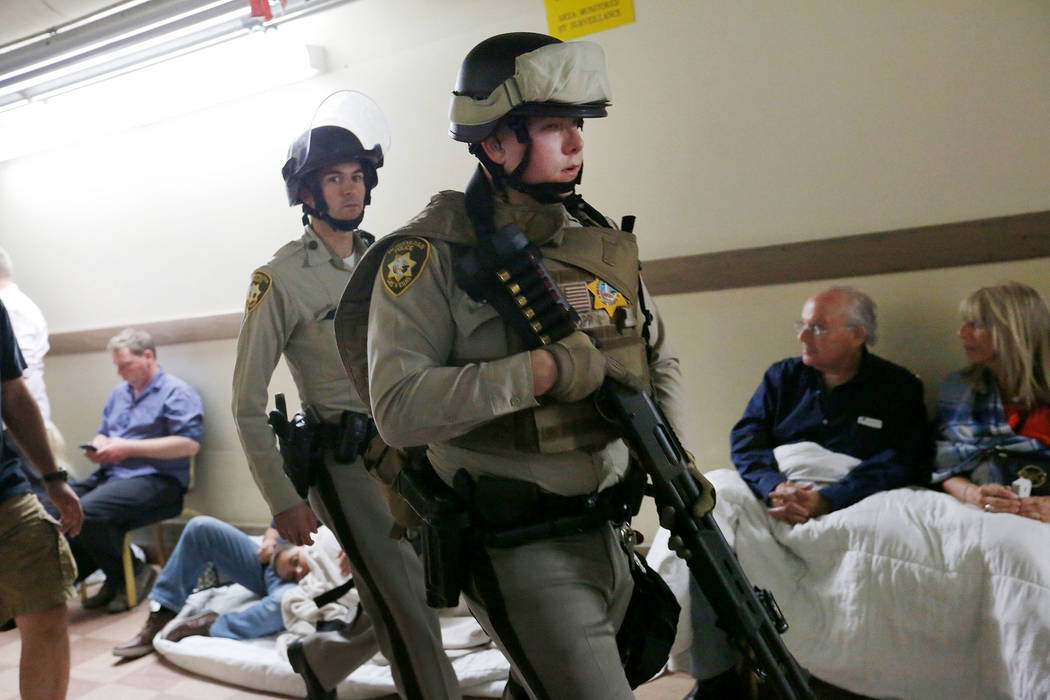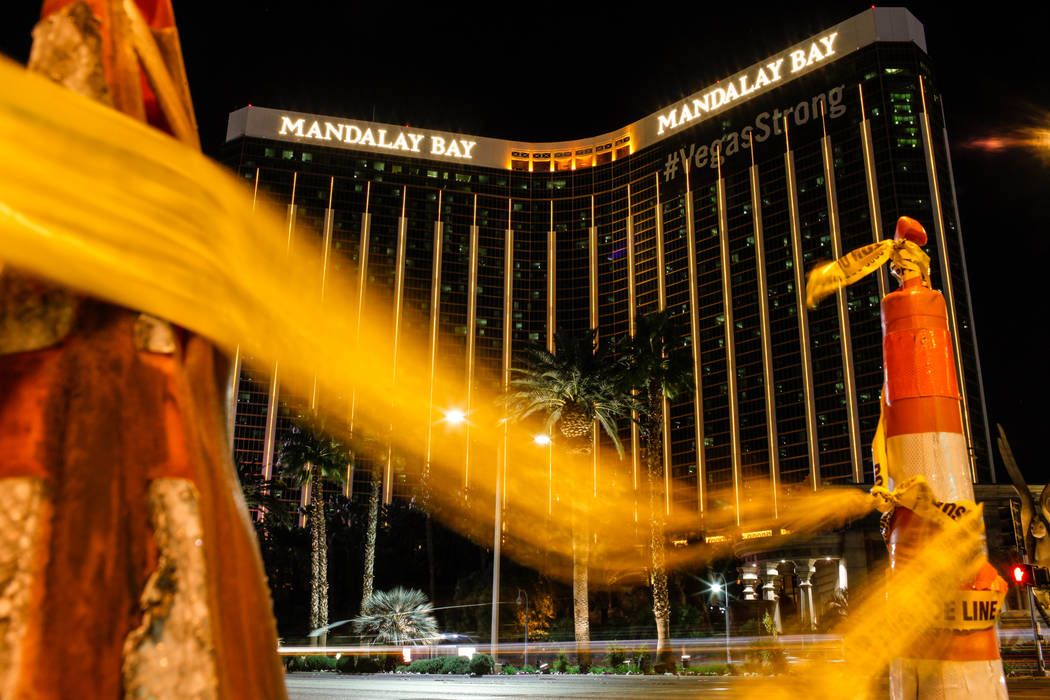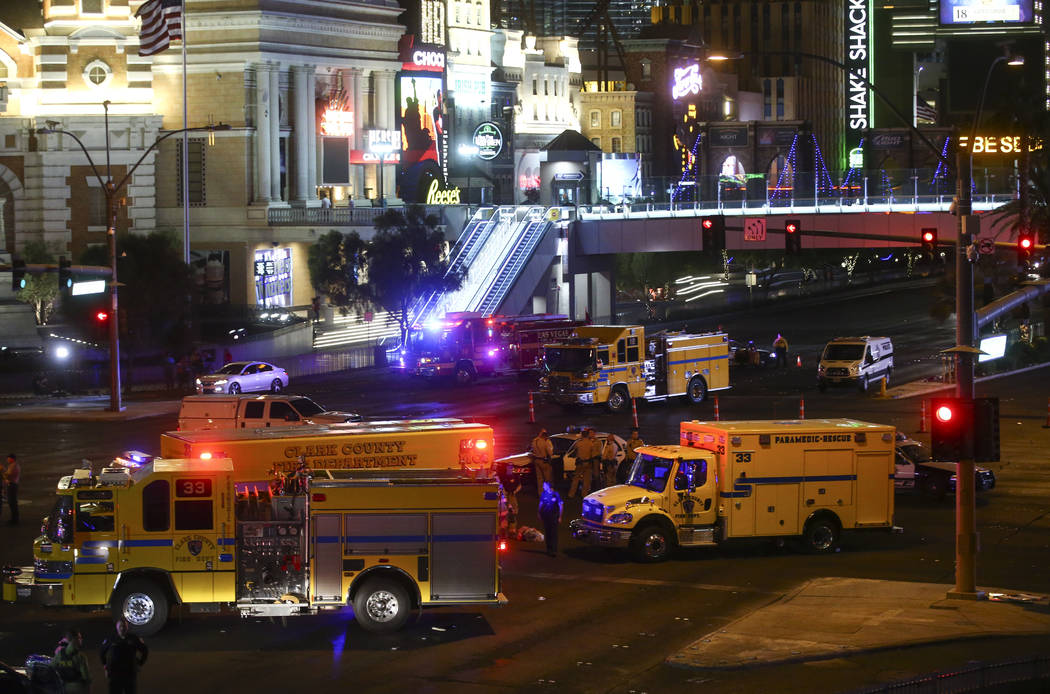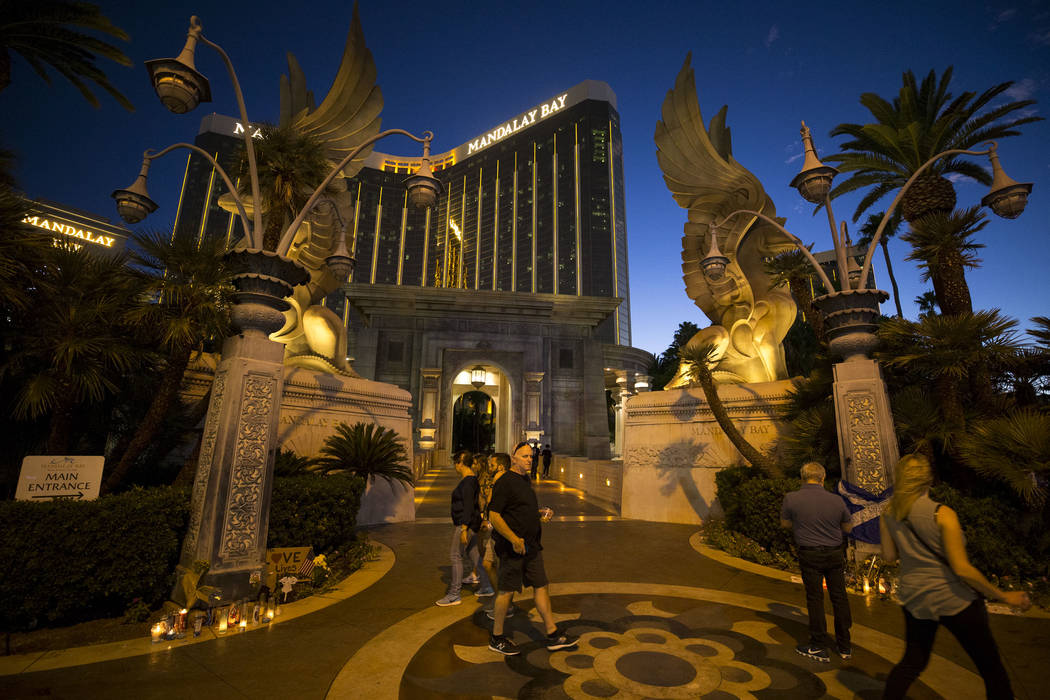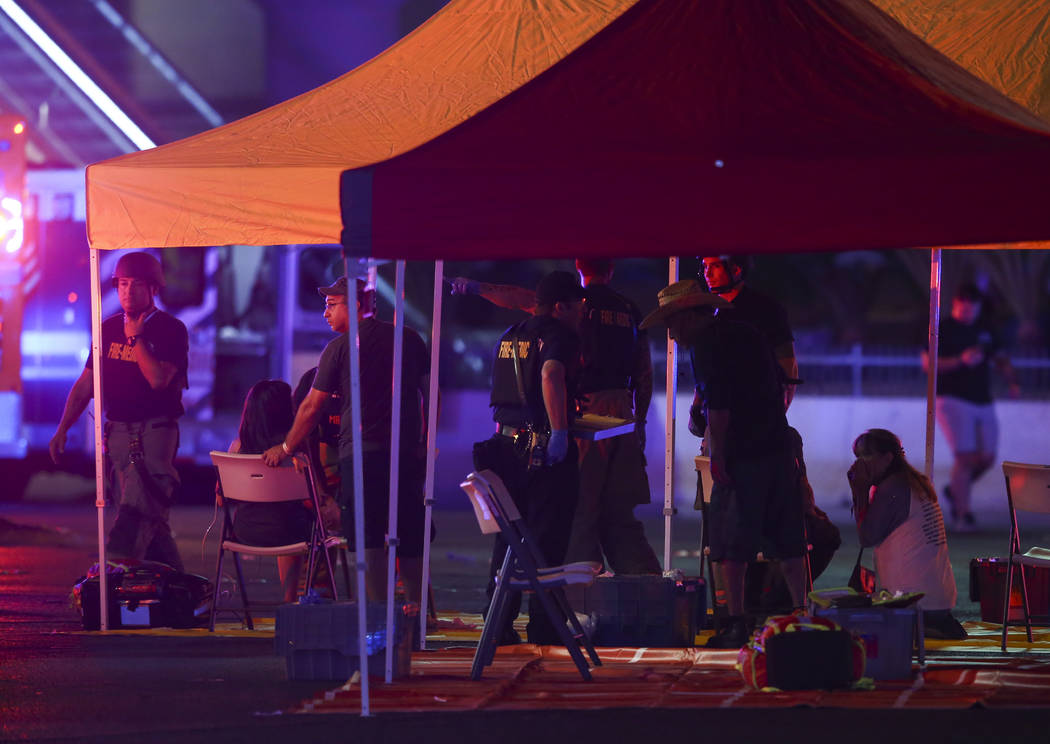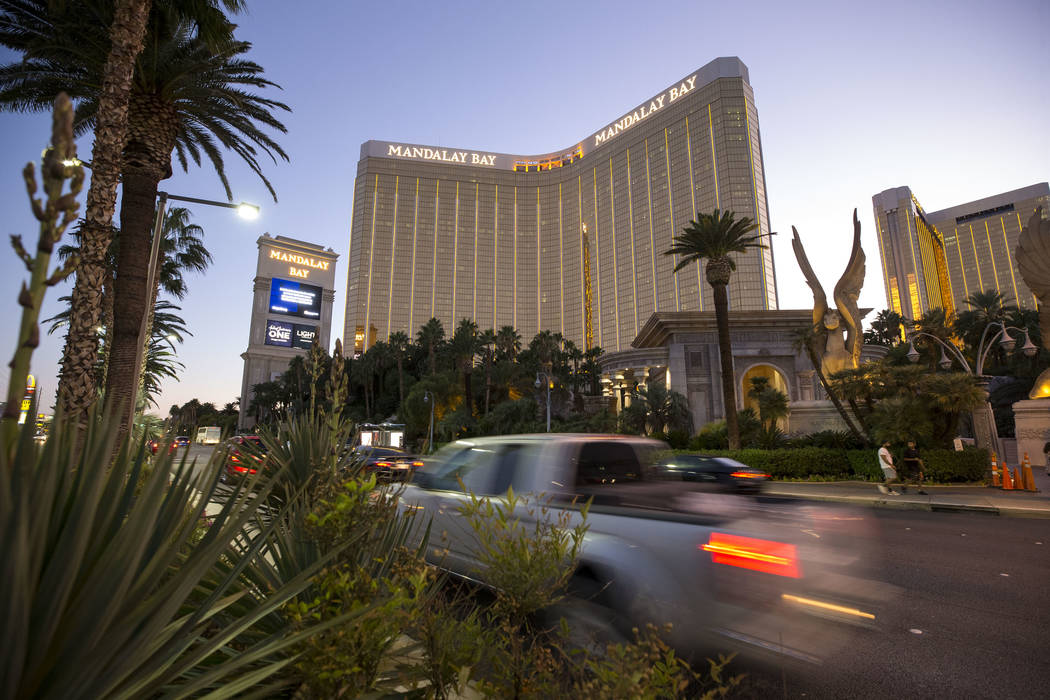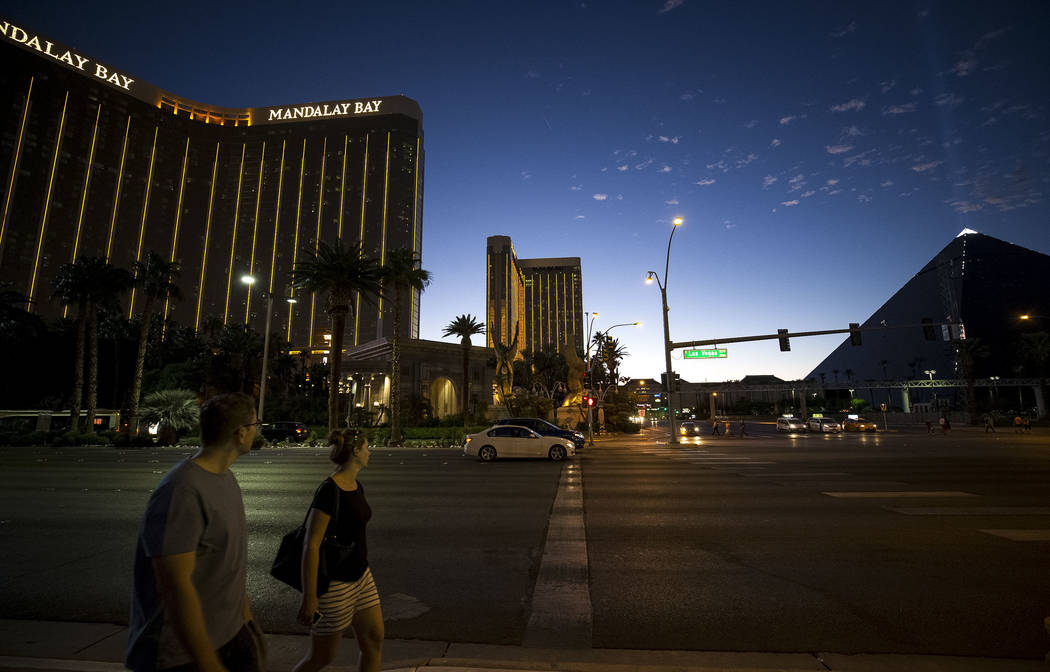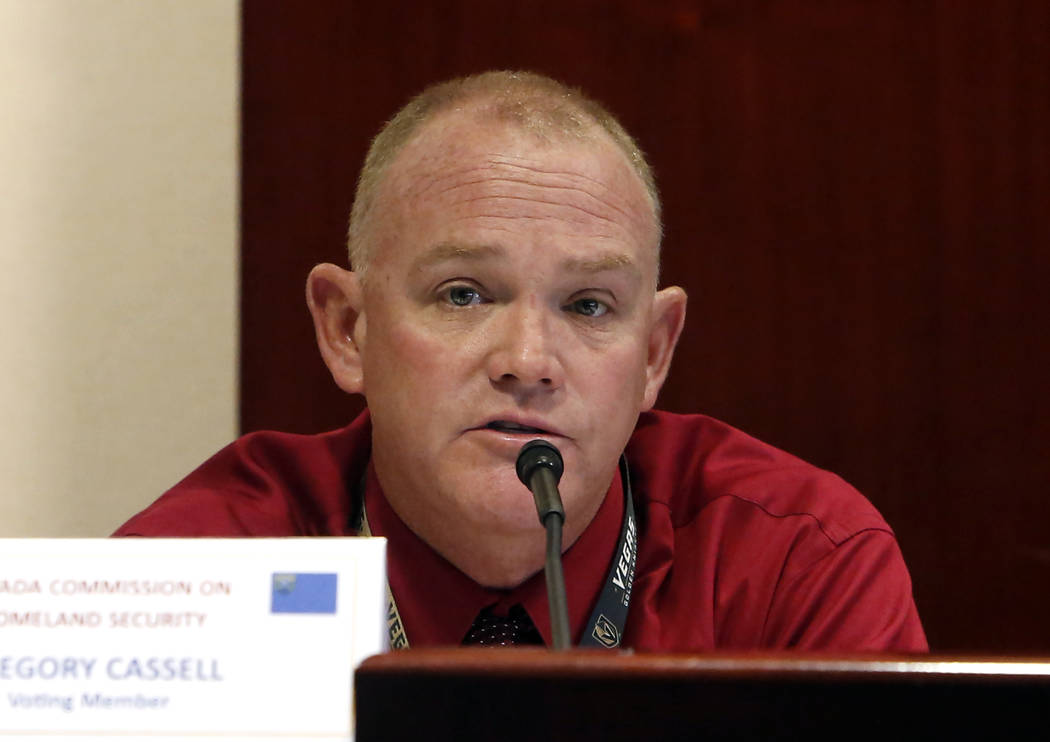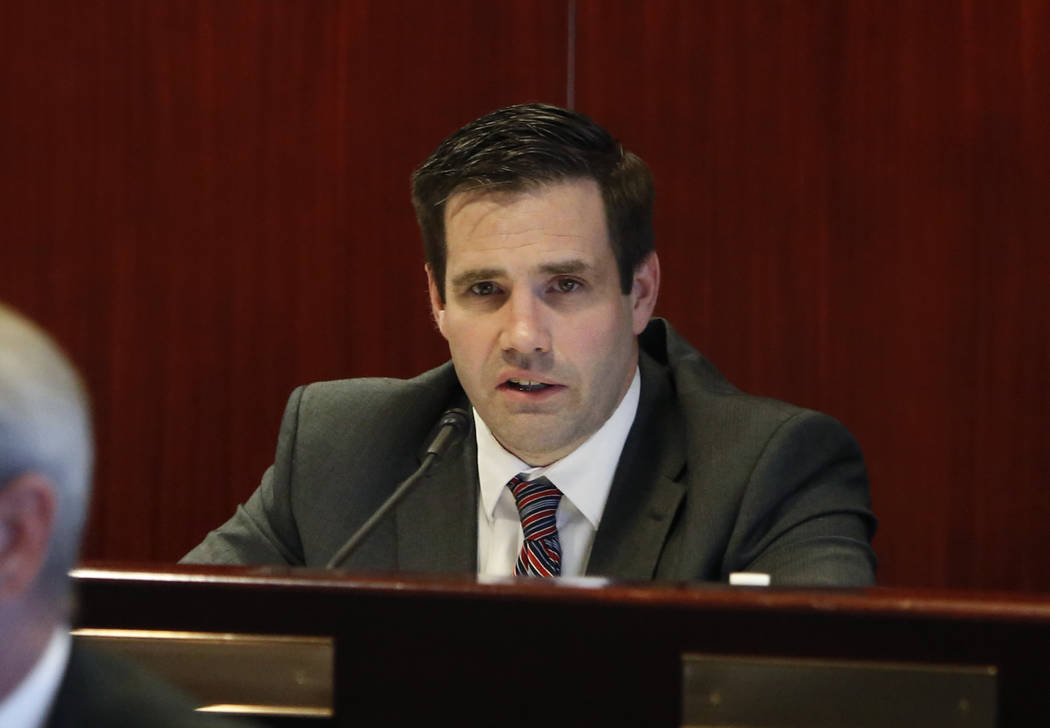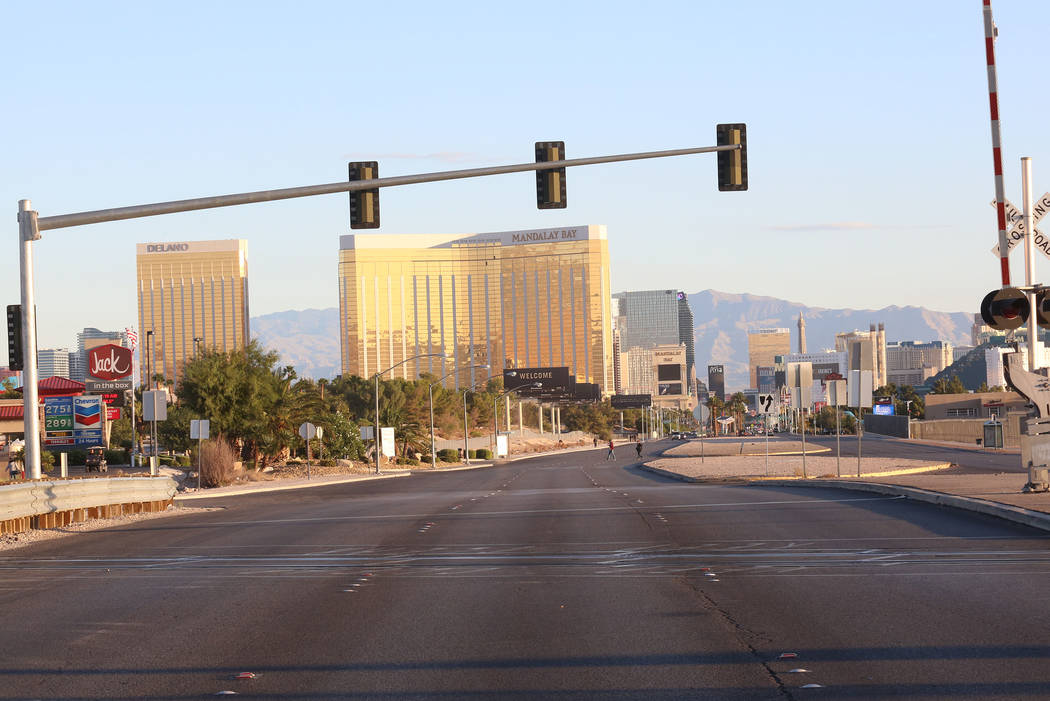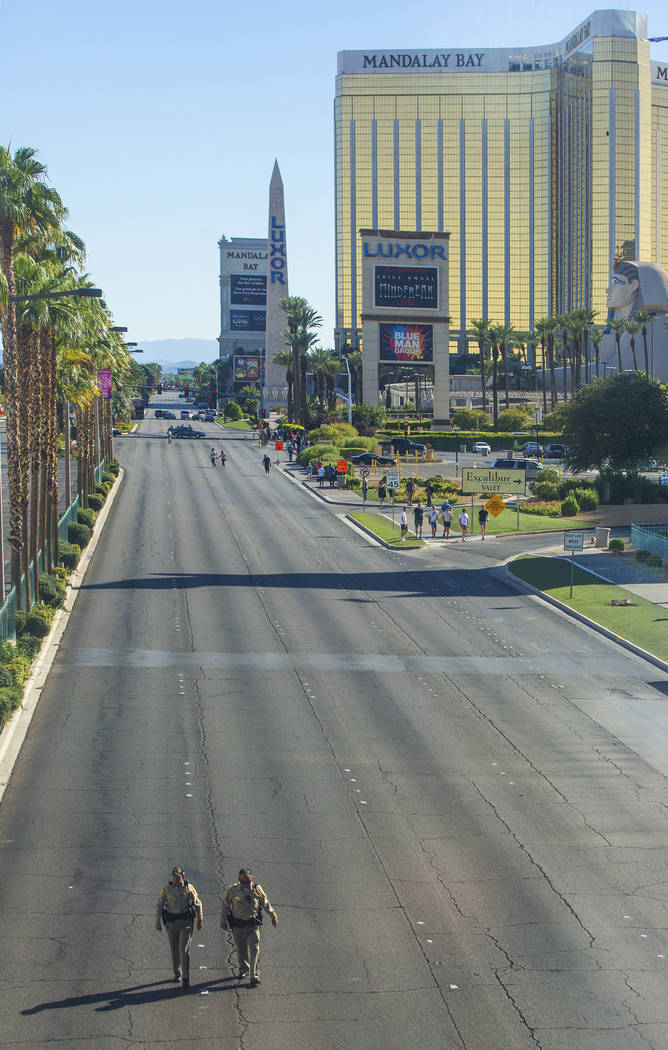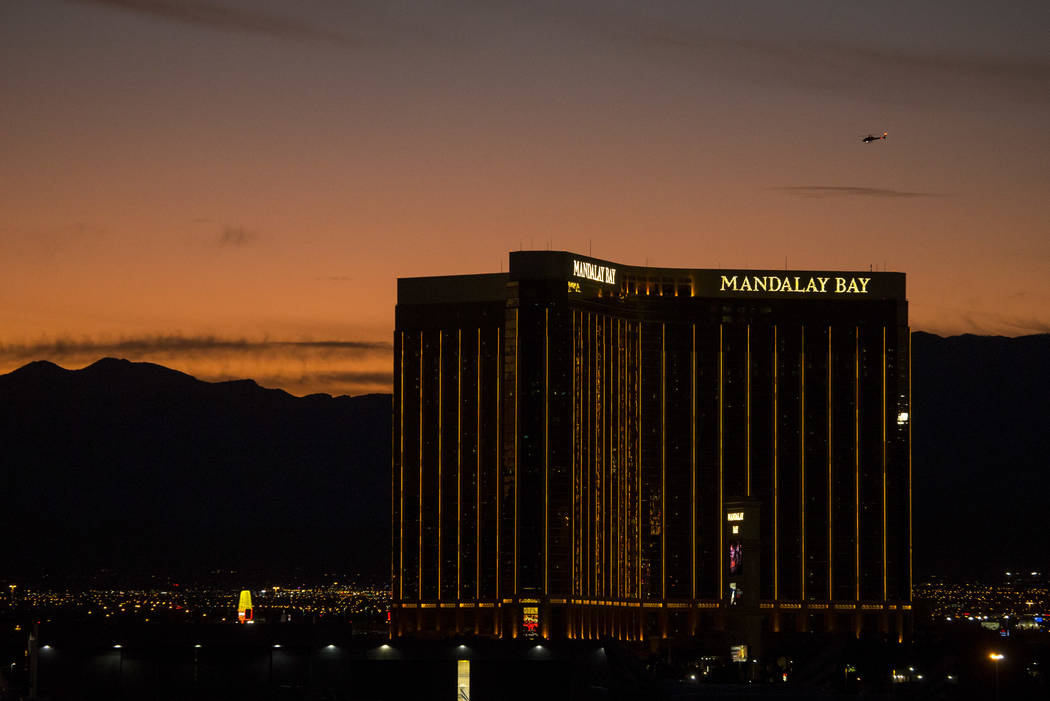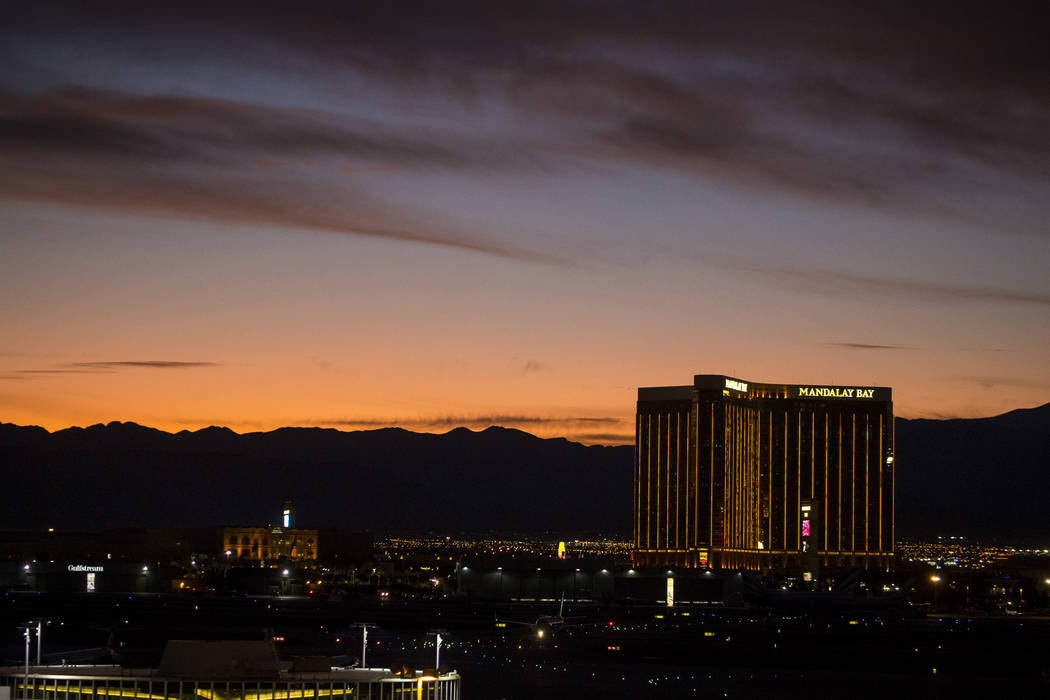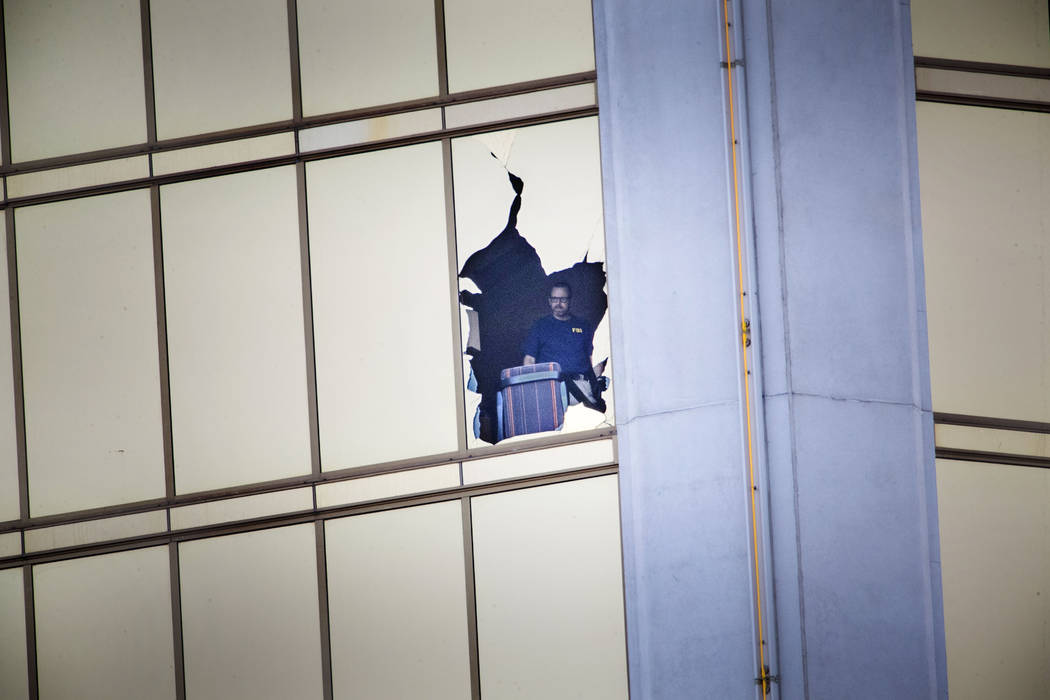After Las Vegas shooting, questions about casino response plans
When a gunman plunged the Las Vegas resort corridor into chaos on Oct. 1, it had been nearly five years since key public safety officials had seen an emergency response plan from a Strip casino, a Review-Journal investigation has found.
State officials have been lax for years in forcing resorts in Las Vegas and across Nevada to comply with a law that requires casinos to file emergency plans.
Among the properties not reviewed by the state in years: Mandalay Bay, where a sniper armed with high-powered rifles used a 32nd-floor suite to attack an outdoor concert across the street, killing 58 people and injuring hundreds more.
The state law, enacted months after the Sept. 11, 2001, terrorist attacks, has no enforcement provisions. State officials said they lack the resources to review the plans.
The Nevada Division of Emergency Management made the same arguments in 2008, when a legislative audit slammed the agency for failing to properly keep track of plans for casinos, state agencies, local governments and school districts.
The audit questioned whether the agency even reviewed the plans and suggested the lack of oversight was hurting the state’s ability to respond to emergencies and natural disasters. After the audit, the division overseen by the Department of Public Safety sent letters to casinos seeking updated emergency plans and later told the Nevada Legislature it had corrected the problem.
Auditors did not follow up.
Years later, state emergency managers have made few if any improvements called for in the audit.
Most casinos on the Strip have not updated their emergency plans with the state since 2012. The law does not require casinos to amend their plans every year, but any changes must be submitted to state and local authorities within three days. More than two dozen casinos — including Strip properties Caesars Palace, MGM Grand , Luxor and The Mirage — have not revised plans since 2008, records from the Division of Emergency Management show. Others include neighborhood casinos Green Valley Ranch, Texas Station, Boulder Station and Santa Fe Station.
Roughly half of 155 casinos in the state required to file or update plans in 2008 did not submit them, documents show.
A leading sponsor of the legislation, former Assemblyman John Oceguera, D-Las Vegas, said the law is still relevant today to catastrophic events.
“An emergency plan covers a wide variety of incidents, including active shooters,” he said.
Nevada and Las Vegas emergency managers would not say whether Mandalay Bay, which last updated its emergency response plan in 2012, properly carried it out on the night of Oct. 1. MGM Resorts International, which owns Mandalay Bay, said the plan’s guidelines for defining roles and responsibilities during an emergency were followed.
Emergency management officials said casino response plans are not etched in stone. Personnel have to adapt to the varying circumstances of each incident.
An emergency plan covers a wide variety of incidents, including active shooters.
MGM Resorts officials would not discuss why state records show several of the company’s Strip resorts have not updated their plans since 2008.
In a statement, the company said, “Emergency Response Plans for MGM properties have been on file with the Nevada Department of Public Safety for several years. They will be re-submitted to county officials this month, per their request.”
The company said it submitted its plans to both state and local authorities in 2008.
Security officers at the 13 MGM Resorts properties on the Strip go through extensive training on active shooters and other emergency situations and rely on the expertise of current and former law enforcement officers, including those at the Metropolitan Police Department, the company said in its statement.
Caesars Entertainment declined to comment on why state records show its flagship resort, Caesars Palace, has not updated its emergency response plan since 2008.
Station Casinos spokeswoman Lori Nelson did not have information on whether emergency plans for several casinos had been submitted to the state since 2008. She said the company recently submitted updated plans for its properties at the state’s request and will send the plans to local police and fire departments.
Wynn Las Vegas and Las Vegas Sands Corp., two other major casino operators on the Strip, said they would update their emergency response plans. State records show the companies’ plans were last filed in 2012.
No state oversight
In this year’s annual report, the Division of Emergency Management said it was responsible for conducting yearly reviews of casino plans, along with plans for schools and utilities. But the report said the agency had only 76 of 139 casino plans on file.
The division reviews the plans to determine whether they comply with the law and to “ensure both our infrastructure and economic base are prepared for any contingency,” the report said.
But no review actually has taken place.
Bill Elliott, the division official responsible for overseeing the casino plans, said he has not had time to read the plans over the years. For the past four years, until last month, he was assigned to other duties and did not even verify that any plans had been submitted, he said.
Elliott said he has little knowledge about what makes a quality emergency response plan. He said there are no standards in place for him to judge a plan.
“My expertise on a casino plan is very minimal,” Elliott said. “If we had a requirement to judge the plans, we would need additional staff to do it.”
Clark County Fire Chief Greg Cassell, whose department by law is also supposed to receive the plans, said none had been provided to the department.
“This is something that we had no clue ever existed,” said Cassell, who is a member of the Nevada Homeland Security Commission.
Police keep work with casinos private
Las Vegas police spokesman Larry Hadfield refused to say whether his department has received any casino plans, which by law must be filed with the agency.
Hadfield also would not allow the Review-Journal to interview a member of the department’s Emergency Management Section, which would be responsible for reviewing any plans.
If we had a requirement to judge the plans, we would need additional staff to do it.
The department also declined to make Clark County Sheriff Joe Lombardo available for an interview.
The plans are confidential and are not subject to public inspection.
Barry Smith, executive director of the Nevada Press Association, said the lack of police response to the Review-Journal leaves “no opportunity for accountability to even check whether these reports are being filed in the way that they are required to by law.”
“This should concern everybody, especially after the shooting at the Mandalay Bay,” he said. “We trust the government to have our backs on this kind of stuff, but when they won’t tell us what they’re doing, we suspect that they’re not doing anything all.”
Oceguera, one of the sponsors of the legislation, said the Legislature should strengthen the law.
The intent of the legislation was to improve preparations for a terrorist attack on the Strip and help resolve communication issues New York authorities encountered during the Sept. 11 attacks, Oceguera said.
“There needs to be some teeth in the law so folks are compelled to act,” said Oceguera, a former North Las Vegas assistant fire chief who now works for a government consulting firm. “But more importantly, a plan on a shelf is virtually useless if it’s not getting to the people who need to see it and use it.”
Mike Davis, a Maryland-based emergency management consultant, added: “They have to coordinate and communicate with the first responders to make sure everyone understands the procedures and anticipates each other’s actions.”
Retired FBI agent Steven Hooper, who specialized in counterterrorism and counterintelligence, said private businesses have a responsibility to have plans in place that include public safety agencies.
“On the day of you don’t want it to be the first time you meet the crisis managers for the first responders because it will be chaos on the day of,” he said.
Casino plans put to use
The Reno Police Department sees the value of casino emergency response plans.
Lt. Robert Larson, of the operations division, said the agency keeps the plans on file for Reno’s half-dozen major resorts.
“They are incredibly useful to us on the back end,” Larson said. “Just having a floor plan is huge in letting officers know where they can go and where they can’t.”
Caleb Cage, chief of the Division of Emergency Management, acknowledged that the state agency has not focused on the casino plans since he took the reins in July 2015. Instead, the agency has concentrated on making sure broader, comprehensive emergency management plans are in place across the state to deal with any natural disaster or mass casualty event.
On the day of you don’t want it to be the first time you meet the crisis managers for the first responders because it will be chaos on the day of.
“We look at planning and preparedness in general — how we can make sure we have plans in place at the state to correspond with local governments and tribal governments that work directly with the local businesses,” he said.
Cage said it is more critical for local emergency responders to see the casino plans than his agency because they are the first ones on the scene.
Local authorities have great relationships with casinos and work closely with them to prepare for emergencies, he said.
But after inquiries from the Review-Journal last month, Cage sent letters to roughly 90 casinos in the state asking them to submit updated response plans to his agency by Dec. 31. He attached a copy of the law to the letter.
Cage said he expects to make recommendations to the Homeland Security Commission on how to improve the law.
One option is to ask the Legislature to strengthen the statute to include enforcement provisions for the Division of Emergency Management, he said. Another is to remove the state from the process and give local authorities the ability to enforce the law. And still another option is to put enforcement in the hands of the State Gaming Control Board, which regulates the casino industry.
In the meantime, Elliott again has been assigned to oversee casino filings with the state division of emergency management.
Cassell, with the Clark County Fire Department, said he is not a fan of the statute.
He thinks it is outdated and requires casinos to submit some information that is not necessary for first responders.
“It’s not a well thought-out law,” he said. “The world is more technologically advanced, right now.”
Since 2010, firefighters have had access to all the information they need about the casinos on their computers in the field and don’t really need to see the emergency response plans, Cassell said. That information includes maps of the casinos that identify exits, water hook-ups, power sources, elevators and fire command rooms.
“I’m comfortable with the information we have, and I’m confident in the capability of our field commanders,” he said.
But Cassell said he still was sending letters to the more than three-dozen casinos in the county asking them to submit their plans under the law by next month.
Just having a floor plan is huge in letting officers know where they can go and where they can’t.
Las Vegas Fire & Rescue spokesman Tim Szymanski said his department does not keep emergency plans for the 21 major casinos within city limits, but instead reviews them when it does annual inspections.
Like the county, the city has a computerized system that provides the necessary information firefighters need when encountering emergencies at casinos, Szymanski said.
In contrast, the Reno Fire Department keeps the emergency response plans on file. The department is also revising its fire code to recommend that the properties update and get approval for their emergency response plans every year, said Capt. Willie Seirer, with the department’s fire prevention division. Much of the information in the state emergency plans overlaps with fire code requirements, he said. However, the state emergency plans also show how casinos would work with law enforcement in a crisis.
“They are complimentary, but neither supersedes the other,” Seirer said.
He said it is important for the department to play an active role in reviewing the plans to make sure the right procedures are put in place. Just recently, he said, a local casino turned in an emergency plan that advised employees to call a supervisor before the Fire Department when reporting a fire.
“I red-lined that part, sent it back and told them to change it so that the Fire Department was called first before a supervisor,” Seirer said.
In New Jersey, the Atlantic City Fire Department also retains emergency response plans for casinos and is in the process of updating those plans, said Fire Chief Scott Evans.
“We have a pretty good relationship,” Evans said. “They are very cooperative with our needs and our partnerships now with casinos to enhance the security of the city as a whole.”
The Review-Journal is owned by the family of Las Vegas Sands Corp. Chairman and CEO Sheldon Adelson. Las Vegas Sands Corp. operates The Venetian and Palazzo.
Contact Jeff German at jgerman@reviewjournal.com or 702-380-4564. Follow @JGermanRJ on Twitter. Contact Anita Hassan at ahassan@reviewjournal.com or 702-383-4643. Follow @anitasnews on Twitter.
What's in a plan?
Nevada law requires casino emergency response plans to include:
— A map of all areas of a casino and its grounds.
— The name and phone number of the emergency response coordinator.
— An evacuation plan.
— A drawing or description of internal and outside access routes.
— The location of any emergency response command posts.
— The location of emergency response equipment and resources.
— A description of any public health or safety hazards at the casino.



